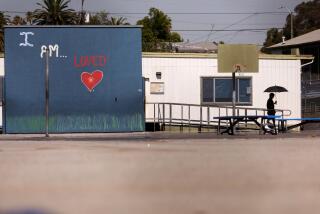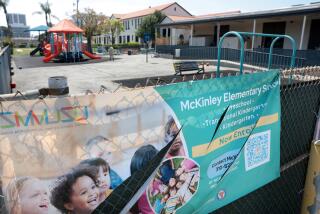Wickes Unit to Replace Problem Carpet at Florida Grade School
- Share via
Carpeting installed by Wickes Cos.’ new Collins & Aikman unit in an elementary school under construction in Florida does not meet certain specifications for smoke density and fire safety and is being replaced by the company, Florida school officials said Tuesday.
Collins & Aikman was alerted to the problem in March, the officials said, just weeks before Wickes issued a release saying it had learned that an undetermined amount of Collins & Aikman carpeting with polyvinyl chloride backing sold in the past 10 years did not meet some flammability standards.
At that time, Wickes said it was unable to quantify the costs of resolving the problem but said they are “likely to be a material amount.”
On Tuesday, a Wickes director investigating the matter acknowledged for the first time that the Florida situation “certainly is one of the things that came up.” But he declined to say how Wickes initially learned of the overall carpet problem, saying that pinpointing the source “is not an easy matter.”
The company has declined to provide details of what its investigation has turned up. The Florida case is the only example to come to light so far of a customer requesting replacement of carpeting.
In its April 15 release, Santa Monica-based Wickes, which paid $1.16 billion for Collins & Aikman last January, said it intended to assure all the carpet manufacturer’s customers, including schools, hospitals and the federal government, that it would “work with them to resolve any questions or difficulties that may arise.”
Later, in an April 24 memo to customers, Collins & Aikman said it had put a hold on shipments of the PVC-backed carpeting, acknowledging that “it had just come to the attention of . . . management that certain irregularities had taken place surrounding the testing and certification” of the product. The carpet is made at plants in Dalton, Ga., where Wickes has dismissed an unspecified number of employees in connection with the problem.
According to Frank McLane, architect for the Pinellas County School Board in Florida, “about 5,500 square yards (of carpeting) has been ripped out (of the Cypress Woods Elementary School), and the cost involved was probably under $100,000.” He added that Collins & Aikman has agreed to install new carpeting in early June, delaying the school’s opening until August or September.
Robert K. Mott, director of purchasing for the Pinellas County schools, said: “We will probably be testing all the carpeting that we’ve bought through them. We probably will go back as far as we can for any carpeting still on the floor.” He added that the state Department of Education is “working on the problem right now.”
Attorney Edmund M. Kaufman, a Wickes director heading a company task force that is investigating the problem, said Tuesday that the “particular carpeting you’re referring to failed to meet a particular specification. We’re not talking about defective or substandard carpeting.”
Asked whether he knew of other schools where Collins & Aikman has been asked to replace carpeting, Kaufman said: “I have no comment. The one school is not, from our point of view, a material amount. We’ve sold 30 million square yards of this in the last 10 years. The problem is not this school but the whole situation.” (At current prices, the 30 million yards represent about $360 million in sales.)
Ironically, as attention turned to schools in densely populated Pinellas County, a peninsula containing St. Petersburg and Clearwater on the Gulf of Mexico, Wickes Chairman Sanford C. Sigoloff was in nearby Longboat Key giving a presentation to a group of New York financial analysts.
The Florida situation offers the first glimpse of how Wickes and Collins & Aikman, which had 1985 sales of $1.1 billion, are working to resolve the problem. Although Pinellas County school officials related somewhat different versions of how the problem was discovered, they generally agreed on the following:
In January, 1986, the schools adopted more stringent specifications for carpeting with respect to smoke density to ensure that children caught inside a burning school would have ample time to escape before the smoke became too thick.
Even though carpet manufacturers submit certification from independent laboratories that their products meet each customer’s specifications, the Florida officials decided last fall to begin their own testing of samples at independent labs. Results that rolled in last January and February showed that some Collins & Aikman carpeting did not meet certain smoke and fire safety tests.
“We gave (Collins & Aikman) all specifics from the tests, and they in turn told us that they would have to take this information back to their manufacturing plant and analyze results and get back to us,” Mott, the purchasing director, said. “They did do that, and it was determined that they would extract all the bad carpeting.”
More to Read
Inside the business of entertainment
The Wide Shot brings you news, analysis and insights on everything from streaming wars to production — and what it all means for the future.
You may occasionally receive promotional content from the Los Angeles Times.








